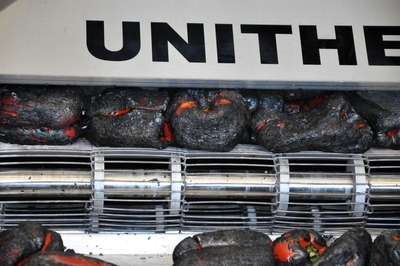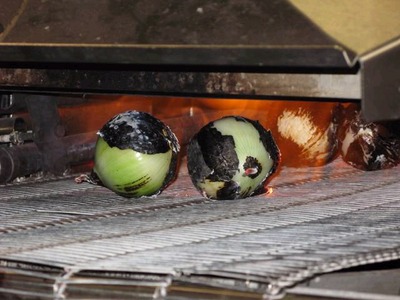Upgrading food quality and processing efficiency
Monday, 18 March, 2013
The use of advanced inline cooking systems is improving product quality and cooking efficiencies among food processors in Australia - and saving on costs.
“Emphasis on the quality of the foods is one noticeable trend in this market,” said Barry Hansell, sales manager at Reactive Engineering in Sydney. “Ready-to-eat (RTE) meals are a good example. Ten years ago you’d be hard pressed to find good quality in frozen meals. But now processors are focusing more on fresh-prepared meals, which allows for higher quality and much greater variety.
“Yield improvement remains important, but with newer cooking system designs, food processors no longer have to sacrifice quality simply to get a bit of extra yield,” Hansell said. “The opportunity exists for them to gain or maintain yield while improving quality and cooking efficiencies.”
Hansell says his customers are increasingly switching from labour-intensive batch cooking to high-efficiency inline processing that improves quality, consistency, yield improvement and throughput, while extending shelf life and improving taste and appearance. Spiral ovens and flame grillers are often important components of these inline cooking systems.

Sydney-based Prontier produces ready-to-eat protein sandwich fillings and meats for pizza and salad toppings, and covers all aspects of manufacturing, distribution and retail operations.
Prontier recently acquired a Unitherm Food Systems flame grill and spiral oven, which gives added flavour and a more authentic product appearance, plus improved efficiencies.
The flame-grill individually quick-flames products, maximising the effects of flame searing while minimising yield losses. Multiple independently controlled burners and touch-screen recipe selection make this unit flexible and efficient.
“We use this equipment to wrap the outside of items in flames and seal the meat,” said Saxon Joye, Prontier founder. “It also browns meat products such as chicken with a char-grilled stripe. The natural-looking flamed colour and authentic grilled flavour are dramatic improvements in the quality.”
Prontier’s meats are fully cooked in a spiral oven - a flexible, small-footprint cooking system developed for processors wanting the benefits of continuous cooking with reliable consistency and lower energy usage.
“Now, instead of batch processing we have a ‘production river’ which provides huge labour-saving advantages and gives us real control over the way we finish every piece of food, making it a beautiful product,” said Joye.

The spiral oven is also used by Primo Moraitis Fresh, which manufactures, processes and packages RTE salads, soups and fresh-cut processed vegetables.
“Before getting this equipment we used combination ovens and other small cooking devices,” said Ben Watt, general manager. “When we first looked at the spiral oven, it seemed like a great piece of equipment that could have a lot of potential uses - which is exactly what it is. We can steam, roast, bake and super roast (roast and steam). The system is really versatile, so it’s in use almost all the time.”
Primo Moraitis Fresh’s principle products are wet salads for gourmet dinners, such as creamy pastas, potato salads and coleslaw.
“We use a lot of bacon, pancetta and meats like that,” Watt said. “We roast those items through the spiral oven. The continuous process gives us great volume with an even cook and great consistency.”
The spiral oven is also used for steaming potatoes, as it does a better job than boiling the potatoes in water. The company produces approximately 400 kilos of steamed potatoes per hour using this system.
Jewel of India is another Australian-based processor using a spiral oven with a spiral chiller to meet quality standards and improve yields and efficiencies.
Jewel of India is an RTE chilled meal manufacturer cooking authentic Indian foods. The company supplies clubs, hospitals, airlines and stadiums, as well as butchers, delis, supermarkets and caterers that service the military and mining industry.
“The spiral oven is installed in our new high-risk production facility, which will provide food safety similar to the newest European and pharmaceutical standards,” said Jim Keating, Jewel of India general manager. “We primarily cook chicken on this system, but it will cook other items that we adopt in the future. We have trialled meatballs, moulded lamb balls, chicken balls and fish through the spiral system, and it has proved very flexible. The system will allow us to adapt quickly to market changes so we don’t run the risk of being left behind.”
Although the spiral oven is newly installed, Keating expects overall yield improvements of 15 to 20%. The system will also improve throughput, optimise product consistency and reduce labour.
“Today, it’s really about output; it’s no longer all about input - the price of beef or lamb, or power, etc,” Keating said. “If you can improve quality and efficiency, that is where the competitive advantage and profits lie.”
Aranet supermarket temperature monitoring solution
Temperature monitoring for supermarkets is extremely important, but gathering data can be a...
Hygienic design for food production automation systems
Integrated Automation Limited (IAL) has set a new benchmark in food production by standardising...
Aussie-built AI aims to solve disconnect issues for food manufacturers
An Australian-built AI solution designed to break down communication blocks between manufacturing...














